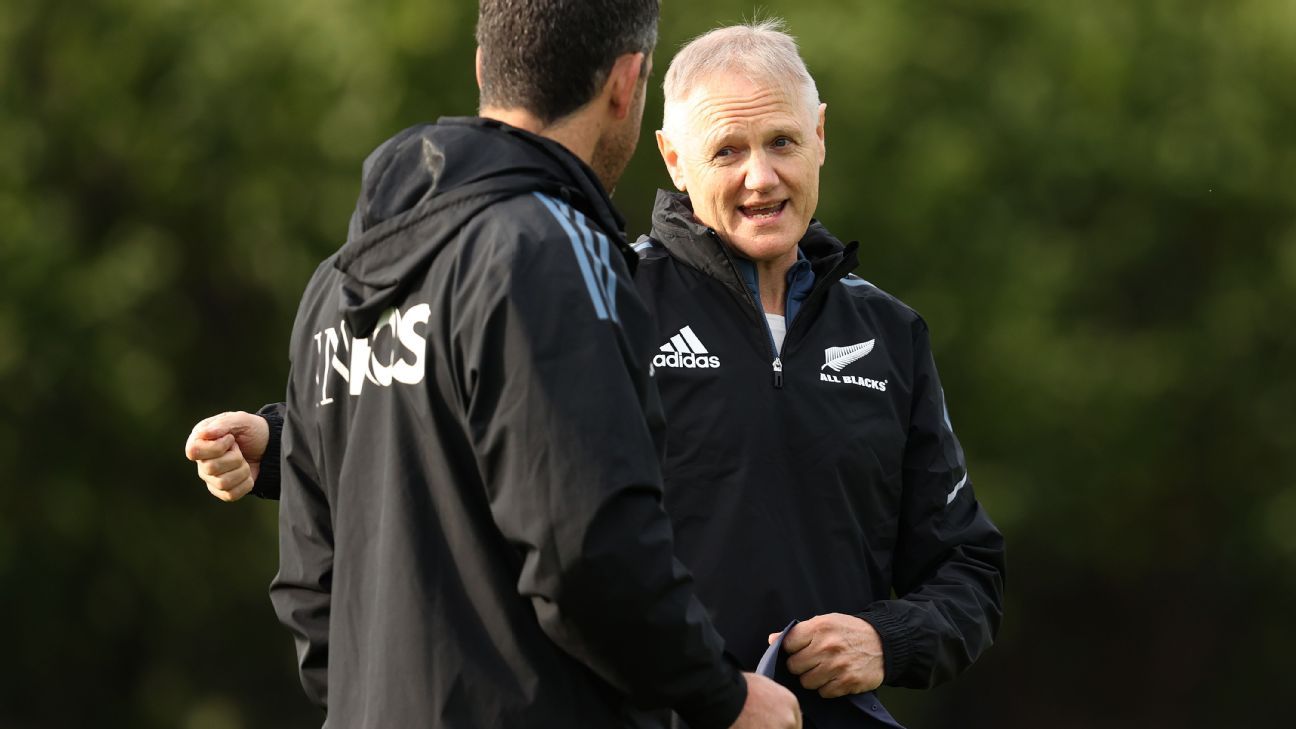What a wild week for the All Blacks.
Just when you thought COVID’s far-reaching effects on major sports events had largely dissipated, the All Blacks opening Test week against Ireland moved from one deflection to the next.
First All Blacks head coach Ian Foster, chief assistant John Plumtree and Crusaders midfielders David Havili and Jack Goodhue went down with the virus. A day later defence coach Scott McLeod was absent; the next electric Crusaders fullback Will Jordan is ruled out – probably until the third Test.
Three days out from kickoff scrum coach Greg Feek tests positive and Mike Cron is called in to cover his role.
Throw in a minor tummy bug that forced Richie Mo’unga to miss Tuesday training, and leprechaun luck appeared to be on Ireland’s side.
Ireland have no doubt been spooked, though, by the All Blacks sending an SOS to Joe Schmidt.
While Ireland evolved during the past two-and-a-half-years under Andy Farrell, Schmidt’s seven-year tenure (2013-19) ensures he holds significant intellectual property on many of the tourist’s influential senior players and their tendencies.
Originally not intended to start his selector/analyst role until the Rugby Championship for fear of rubbing Ireland up the wrong way, Schmidt attended All Blacks training on Tuesday and Thursday, largely contributing to the defensive area. Yet after being spotted having coffee with management at the team hotel, Schmidt is sure to be offering insight across the board.
Navigating any Test week with your head coach and forwards mentor confined to zoom is far from ideal. Despite that drama, the All Blacks continue to project a picture of calm as senior players relish the chance to accept greater responsibility earlier than usual.
“The team has been really impressive to be honest,” All Blacks captain Sam Cane said. “Maybe it’s because we’re so used to it throughout Super Rugby every team had so many things to deal with. We’ve been rolling with the punches. Obviously it’s not ideal but in terms of disruptiveness, surprisingly there hasn’t been too much at all.”
The absence of Havili, who was expected to start at second five-eighth, Goodhue and Jordan, the latter a lock for the right wing, has forced changes to the All Blacks preferred starting backline with Chiefs No. 12 Quinn Tupaea and Sevu Reece injected in their place.
Scott Barrett’s selection at blindside flanker – for the first time in a test since the same ill-fated move for the 2019 World Cup semifinal defeat to England – is the major talking point that suggests the All Blacks are intent on targeting the lineout.
“I didn’t spend too long thinking about the 2019 game. We took some lessons from that but they were learnt a long time ago,” All Black coach Ian Foster said. “This one we were very clear about the strategy. It’s something we’ve talked to Scott before about.
“Apart from his set-piece acumen he’s bringing a bruising defence and he’s probably our most dynamic ball-carrying lock at the moment so we can utilise that a bit at six. He finds the roles similar now apart from a couple of defensive tweaks which we’ve had to make sure we tidy up.”
Interest abounds, too, in the selection of two rookies – powerhouse Crusaders wing Leicester Fainga’anuku on the left edge and, on a similar theme, Chiefs loose forward Pita Gus Sowakula’s ball carrying presence from the bench.
Ireland arrive in New Zealand with the All Blacks’ nemesis tag, having won their last meeting in Dublin and three of the last five Tests between the two proud rugby nations.
Eden Park sold out weeks ago, telling you everything about the hype surrounding the most anticipated July series since the 2017 British & Irish Lions tour. Prior to that, you have to go back to England’s tour a in 2014 to gauge similar widespread engagement.
That’s a mark of respect for Ireland, and the sense of jeopardy they bring to their quest for a maiden triumph on New Zealand shores.
For the All Blacks, it’s a simple equation. After successive defeats to end last year they must alleviate mounting concerns, particularly around their aging forward pack’s ability to deliver a dominant platform.
The Māori All Blacks went some way to easing trepidation with their impressive 32-17 victory against Ireland in Hamilton on Wednesday night. Farrell noted post-match he had 15 Test players sitting in the stands but that result was a setback for Ireland from a confidence and personnel point-of-view.
Starting any tour with defeat is harder to get up from – especially for those who must now back up three days later against the All Blacks.
Bringing out 40 players for a tour that encompasses five matches – two against the Māori – in three weeks at the end of another long season for Ireland doesn’t look like nearly enough troops.
Ireland lost Lions lock Iain Henderson and hooker Rob Herring to injuries before a ball was kicked and Wednesday night claimed further casualties with Jimmy O’Brien and James Hume in doubt.
The All Blacks are typically rusty in their first Test of the year. Despite the locals last losing at Eden Park in 1994, the COVID complications add to the sense the opening Test is Ireland’s best chance of causing a boilover.
“Clearly it’s been an intriguing week,” Foster, who plans to emerge from home isolation in time to attend Saturday’s Test, said. “We’ve been used to this over the last couple of years but this is a unique week for us. We’re excited about the team we’re putting out there. It doesn’t change the statement we want to make on the first Test of the year. It’s always been a tricky one for us but we’re ready to go.”
Ireland’s recent success against the All Blacks denotes their threat. They are, however, a long way from Dublin. And they will need to be infinitely better than the performance their midweek side dished up.
